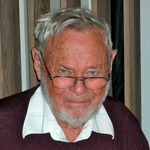Hugh E. DeWitt

Hugh Edgar DeWitt of Berkeley died March 28. He was 83.
DeWitt was born in 1930 in Memphis, Tenn. He graduated from Stanford University in 1951 and received his doctorate from Cornell University in 1957.
DeWitt began his career at Lawrence Livermore National Laboratory in the Theoretical Physics Division on Feb. 4, 1957. During his 39-plus years at LLNL, DeWitt directed the Ph.D. thesis of six UC Berkeley physics graduate students and chaired the APS Committee on International Freedom of Scientists in 2000, thereby contributing to public policy issues on a comprehensive nuclear test ban treaty, and human rights for scientists. During his career was the period of the growth of the electronic computer from infancy to modern versions. DeWitt and his collaborators took the advantage to advance his main field of interest, strongly coupled plasma, by using computer simulations. DeWitt retired in 1997. After his retirement, he continued to work until June 4, 2013 in the same field under the visiting scientist/professional program at LLNL. DeWitt’s connection to the Lab totaled more than 56 years.
During 1963–64, DeWitt was a Fulbright professor at the Institute of Mathematical Sciences in Madras, and was a visiting professor of physics at the University of Iowa in 1970–71. He was a fellow of both the American Association for the Advancement of Science and the American Physical Society, Division of Plasma Physics. His honors included membership in Phi Beta Kappa and Sigma Xi, and the Federation of American Scientists Public Service Award in 1988.
A symposium “Problems and Perspectives in Charged Particle Systems” celebrating DeWitt’s 80th birthday was held at the UC Berkeley Faculty Club in May 2010. An obituary by his scientific collaborators was submitted to Physics Today for publication.
DeWitt enjoyed swimming at the Livermore city swimming pool and bicycling back to his office during the lunch hours.
DeWitt is survived by his wife of 58 years, Sanne; two sons and three grandchildren. His daughter predeceased him.
DeWitt’s funeral and visiting followed soon after his passing in tradition of Jewish custom.




